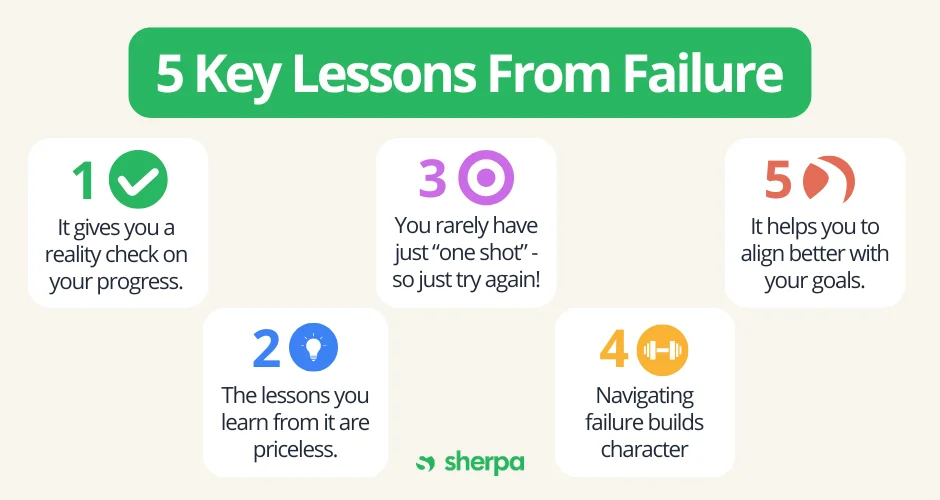GUEST POST
The Positive Side To Failing

Failure can be an overwhelmingly scary thing for a lot of people, which is understandable. Generally, we feel nothing good can come from failure, as it makes us look bad and constitutes a waste of time and resources. However, not only is this untrue, it can be a very counter-productive mindset to have that can stop progress right in its tracks.
If you can learn to respond and process it appropriately, failure can provide you with opportunities to learn, give you the knowledge on how to improve and even build your confidence. Facing fears, particularly the fear of failure, can have huge benefits which can even extend beyond your studies. Life and success coach Alice Dartnell even goes so far as to say that the lessons learned from failure are “priceless” and stresses the importance of learning through experience.

I have plenty of experiences with failure, and while I wear that as a badge of honour now, it definitely wasn’t always the case. Like many people, when I was 18 I went straight from sixth form to university. However, unlike the majority of people, I didn’t have the best experience and ended up dropping out at the end of my first year. At the time I felt completely defined by my failure and couldn’t see any way past it. It was such a huge weight over me.
Psychotherapist Amy Morin writes in Verywell Mind that these feelings are very common when facing failure and details some healthy ways to respond to failure, including embracing any emotions and being aware of trying to minimise how you really feel. As part of my personal development, I started working and that built my confidence. With that, I signed on to a CELTA course where I qualified to teach English as a Foreign Language.
The course was very difficult and stressful. We started teaching students on the second day, and on top of long class hours, had to write weekly essays. But despite the pressure, intensity and multiple failures along the way, I passed and became qualified. I felt myself start to emerge from the shadow of my former failure and felt emboldened to try new things without worrying about not being great at them straight away. I moved abroad, taught full-time, and tried out new sports and activities. I was feeling more like myself than I had in a long time.
It was during this period of trying new things that I found what is still one of my great passions today, Powerlifting. Powerlifting has been one of the best ways I have found to help me to continue to approach and deal with failure without fear or regret. To clarify, powerlifting means training to lift the heaviest weight possible in three different ways, deadlift, squat and bench press. The way you do this is by continually practising these lifts with more and more weight until you cannot physically move them anymore.
Weightlifters literally call this “training to failure” and we do it all the time! If you don’t believe me, Emily Campbell, who is a Team GB Olympic Weightlifter (Olympic Weightlifting is slightly different to powerlifting but it has the same approach to failure) failed a lift on the Olympic stage at Tokyo 2020.

She failed her second attempt at lifting 122kg, but she was asked to lift again and succeeded. She then went on to do so well in her second event that she became an Olympic silver medalist and the first woman to bring home a medal for Team GB from Tokyo. A year later at the Birmingham 2022 Commonwealth Games Campbell smashed her previous record and won gold. Campbell credits her success to her hard work, self-focus and support from her community. For weightlifting, failure is just part of success.
Even though powerlifting is, obviously, very different to academia, this mentality of intentionally pushing myself to the point where I know I couldn’t do any better has been so helpful for me in lots of areas of my life. It’s genuinely comforting for me to know that I did my absolute best, and that failure means I’m just one step closer to my goal. We all know staying active is good for our bodies but it can keep your mind in a really healthy place too. If powerlifting sounds interesting to you, please make sure you get started safely.
This period of learning from small failures and building confidence to emerge from a life-defining one came to a head for me in 2019 when, aged 25 I decided to go back to university and get my undergraduate degree. Once again there was potential for failure, and the high stakes made it much scarier than not being able to lift a weight in the gym.
University is very expensive and time-consuming even though the rewards can be great. Coming in as a mature student I initially felt a little insecure about how much younger everyone else was, until I noticed that my classmates were often very quiet during discussions in seminars or when lecturers asked a question.
I asked some of them about it and they all had pretty much the same answer “What if I get it wrong? What if I look stupid?” I realised I had a great strength in knowing that getting wrong answers can be an important part of learning. I maintained that attitude throughout all three years of my undergraduate degree and graduated with a first-class degree and a prize for best dissertation.
Now I am studying for a Masters degree and looking into a Ph.D. so that I can eventually lecture in my subject. It’s thrilling, and sometimes even overwhelming, to look back and think about how I once felt I was entirely defined by a “university dropout” and am now a postgrad with high hopes for the future.

Nothing can stop you if you learn to accept failure as part of the process to success.
My Masters degree is in linguistics which is the science of language. Although it’s not often thought of as a STEM subject, many linguists use scientific methods and data analysis tools. Scientific experiments run the risk of failure all the time. In linguistics this can be high stakes because experiments involving people can cost a lot of time and organising efforts to pull off, however, it’s really important to remember that no matter what your discipline, a null hypothesis is not a bad thing.
For example, a peer of mine wrote her undergraduate dissertation on the changing accent of a particular rockstar. She hypothesised that his accent had changed over time to become more middle-class. She listened to interviews and carefully analysed parts of his speech and found… nothing. His accent has barely changed since he first became famous, she was wrong. But she still got a first for her project.
Even though her hypothesis had been nullified and her experiment had “failed”, her meticulous documentation and the high calibre of her presentation earned her a high grade.
Furthermore, she had solid evidence that despite popular opinion that in his early career the rockstar had been pretending to be less posh than he actually was, that wasn’t the case at all, which for someone interested in accent change and perception is extremely useful and interesting. If you are diligent with your methodology and communicate your findings well, then there’s no such thing as a failed experiment.
A multiple authored study of perspectives of failure among science students stressed that “failure is hardwired into the scientific method” but “teaching students to productively engage with failure is not foundational in most curricula”. Whatever your discipline, you may not be explicitly taught how to respond positively to failure, but it’s still a vital skill to hone. So now that you know my experiences of failure and how to deal with it, I would like to leave you with my top three tips for dealing with past failures:
Top 3 pieces of advice for dealing with past failures:
Don’t pressure yourself to deal with it straight away
As much as there are positive sides to failing, it can still be a hard thing to come to terms with, especially if it’s something you invested a lot of effort in. Give yourself time to deal with any negative feelings you have and properly reflect on the experience, otherwise, you could end up rushing into a new effort without learning anything from your previous attempt.
Tell someone about it
It’s very common to feel shame around failure and not want to tell anyone about it. But shame is a very counter-productive feeling and can compound any sadness you might feel. Sharing the story of your failure is a good way to remind yourself that there’s nothing to be ashamed of.
Talk to someone you trust, you may be able to laugh about it and they may even have some ideas on how you can come back from your failure bigger and better!
(When you’re ready) examine where there are opportunities for growth
Once you’ve processed your emotions, you’ll be ready to examine your failure from a more analytical angle. I find it best to think about the steps of the process and where I could do better at each step (this includes any kind of preparation!).
Make notes if that makes it easier to think through and then distil everything down into one or two pieces of advice you can give yourself when you try again. Try to make them specific like “When I retake my exam I will write up a detailed study plan at least a fortnight before” or “When presenting in class I will practise with a small group of friends first”. This will make your improvements more achievable than “I will study harder”.
Top 3 pieces of advice for moving forward without being afraid of failure:
Build up to it
The idea of failing can be very overwhelming. Try it with something low-stakes and fun. Team up with a friend and try a new sport or activity, or have a go at a game or puzzle which you don’t usually play. You probably won’t be very good at first and you might fail a few times. When you do, take the time to notice what really happened.
You might feel a little embarrassed, you might need to take the time to have another go, but the world won’t have ended. It’s all fine. Trying and failing in these smaller ways can help you develop a more positive mentality when it comes to failure that you can then apply to bigger endeavours.
Ask yourself “What’s the worst that could happen?”
“What’s the worst that could happen?” is usually reserved for subpar foreshadowing in action movies but I have found it to be a really useful confidence-building tool. Anytime I’m anxious to try something because I’m feeling the fear of failure I just ask myself “What’s the worst that could happen?”.
This helps me to really consider what the ramifications of failure might be and nine times out of ten the worst is really not that bad. Our subconscious minds can sometimes catastrophise unknown consequences and blow them way out of proportion. Giving yourself a little time to really think about what those consequences could realistically be can often make your effort seem much less daunting.
Recognise how far you’ve come
It can be all too easy to feel like you’re not where you should be while you’re studying. It’s very common when you’re constantly being given new content to learn that some of it will get past you and you can feel as if you’re not keeping up.
Rather than focusing on what you don’t know, focus for a moment on what you do. Think about where you were and what you knew a year ago and reflect on how much you’ve grown since then. Remember as well that you will have had failures in that time, but you have recovered and learned from them before, and you definitely can again.
Parents
Students

Alice D
Tutor
CELTA qualified English tutor (ESL and GCSE Literature and Language)
Looking for a tutor?
Sherpa has hundreds of qualified and experienced UK tutors who are ready to help you achieve your goals. Search through our tutors and arrange a free 20 minute introduction through our industry-leading online classroom.
Find a TutorSimilar Articles



